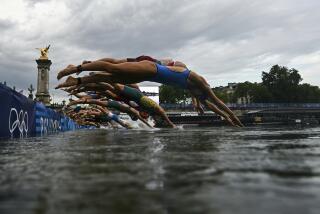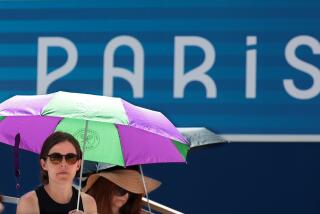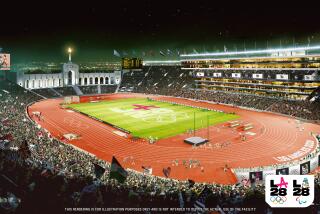THE OLYMPICS: WINTER GAMES AT ALBERTVILLE : NOTES : Speedskating Track Has Cracks; Melting Is Decried by Coaches
- Share via
Cracks appeared in the Olympic speedskating track Saturday, the latest problems with the outdoor oval to upset skaters, coaches and officials on the eve of competition in Albertville, France.
“The cracks are a big problem for the short distances, especially the 500 (meter),” said A.B. Krook, coach for the Netherlands.
Officials downplayed the issue, saying they would have the track in condition before the women’s 3,000-meter race today.
“Really, it’s not a problem because we have all been working on the ice, and now it’s only a problem because of the sun,” track technician Jacques Poirel said. “It’s only a little bit broken, but after this night we work and tomorrow morning it will be OK.”
Venue manager Thierry Courteville said the cracks could be repaired before the start of today’s race. Overall, Courteville said, the course was in good shape.
Worries about the track, which was built to be easily dismantled after the Games, began long before the Olympics. Ernst Eidloth, an ice maker at the track in Inzell, Germany, warned that the refrigerated rink’s design made it impossible to adjust the thermostat for temperature changes.
Rain and slushy snow early in the week left the surface rough. When the skies cleared, skaters discovered another problem. The late afternoon sun, which shone on about half of the track at the time many events were scheduled to start, caused a substantial temperature difference--as much as five degrees from one side of the oval to the other.
American skaters had said Friday that the sun was causing serious problems and Coach Peter Mueller recommended that the competition be delayed every day.
“If it stays warm like this, I’d like to see them postpone it for an hour, two hours,” he said. “If they want fair competition . . . that’s the best way to do it.”
On Saturday, however, the International Skating Union rejected a plea to move races to the evening.
For the longer races, especially the 10,000 meters, in which the competition can last up to six hours, Krook said the warm ice on one side of the track would slow the early skaters. Those who skate after the sun sets will have faster times because the ice will be hard on both sides of the oval, he added.
Technical director Gerd Zimmerman said the situation would be reassessed for the men’s 5,000 and 10,000, which are scheduled later in the Games.
But Zimmerman held out little hope for a change in the starting time.
“To postpone the starting time is basically impossible,” he said.
Koop, the Dutch coach, said: “It’s very difficult, and I’ve heard from the referees and the organization that they won’t do that because there’s television. Television is more important than skaters.”
CBS, which holds the U.S. broadcast rights, said they were not a part of the scheduling. The IOC and speedskating federation handle that, spokeswoman Sandy Genelius said.
More to Read
Go beyond the scoreboard
Get the latest on L.A.'s teams in the daily Sports Report newsletter.
You may occasionally receive promotional content from the Los Angeles Times.






